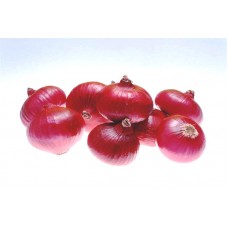Onion is a wonderful bulb-vegetable and oldest edible food sources
known to humankind, is found in a bewildering array of recipes and
preparations, be it your favorite salad, or mouth-watering gravy or curries. It
has also been in used in traditional medicines since ancient times for its
health promoting and curative properties.
While buying, look for fresh ones that are clean, uniform,
well-developed without having opening at the neck and feature crispy, and dry
outer skins.
Avoid those that show sprouting or have signs of black mold (a kind of fungal attack) as they indicate that the stock is old.
In addition, poor-quality bulbs often have soft spots, moisture at
their neck, and dark patches, which may all be an indications of decay.
Onions are high in vitamin C, a good source of fiber, and with
only 45 calories per serving, add abundant flavor to a wide variety of food.
Onions are sodium, fat, and cholesterol free, and provide a number
of other key nutrients.
·
Onions
are very low in calories (just 40 calories per 100 g) and fats; however, rich
in soluble dietary fiber.
·
Phyto-chemical
compounds allium and Allyl disulphide in the onions convert
into allicin by enzymatic reaction when its modified leaves are
distorted (crushing, cutting, etc.) which has anti-mutagenic (protects from
cancers) and anti-diabetic properties (helps lower blood sugar levels in
diabetics).
·
Allicin reduces
cholesterol production by inhibiting the HMG-CoA reductaseenzyme in the
liver cells. Further, it also found to have anti-bacterial, anti-viral, and
anti-fungal activities.
·
In
addition, Allicin also decreases blood vessel stiffness by releasing
nitric oxide (NO) and thereby bring a reduction in the total blood pressure.
Further, it blocks platelet-clot formation, and has fibrinolytic action in the
blood vessels. Altogether, it helps decrease in overall risk of coronary artery
disease (CAD), peripheral vascular diseases (PVD), and stroke.
·
Onions
are rich source of chromium, the trace mineral that helps tissue cells
respond appropriately to insulin levels in the blood. It thus helps facilitate
insulin action and control sugar levels in diabetes.
·
They
are an also good source of antioxidant flavonoid quercetin, which is found
to have anti-carcinogenic, anti-inflammatory, and anti-diabetic
functions.
·
They
are also good in antioxidant vitamin, vitamin-C and mineral manganese.
·
Manganese
is required as a co-factor for anti-oxidant enzyme, superoxide
dismutase. In addition, isothiocyanate anti-oxidants in them
help provide relief from cold and flu by exerting anti-inflammatory actions.
·
Onions
are also good in B-complex group of vitamins like pantothenic
acid, pyridoxine, folates and thiamin. Pyridoxine or vitamin B-6
helps keep up GABA levels in the brain, which works against neurotic
conditions.
Onions should be stored in a well ventilated space at room
temperature, away from heat and bright light, moisture and humidity. With the
exception of green onions, do not refrigerate onions.
Place them in a wire hanging basket or a perforated bowl with a
raised base so that air can circulate underneath.
Used as curries, stir-fries, soups, stuffing,
pastes, sauces, etc., everyday.
Onion
- Product Code: 160418
- Availability: In Stock
-
Rs.10.00
- Ex Tax: Rs.10.00



